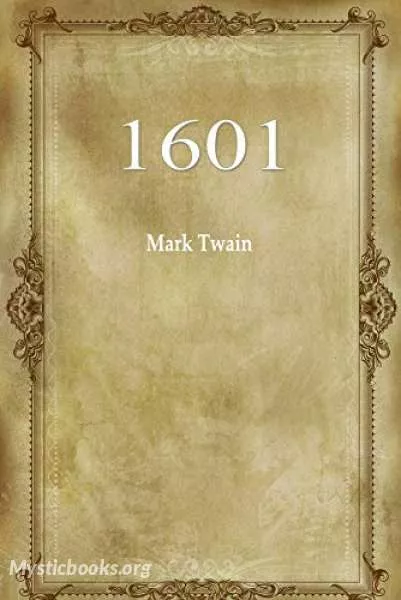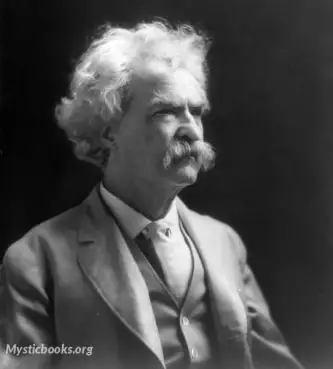
1601: Conversation, as it was by the Social Fireside, in the Time of the Tudors
by Mark Twain
'1601: Conversation, as it was by the Social Fireside, in the Time of the Tudors' Summary
The diarist describes a conversation in the presence of the queen between various famous Elizabethans during which one of the company passes gas:
"In ye heat of ye talk it befel yt one did breake wind, yielding an exceding mightie and distresfull stink, whereat all did laugh full sore."
The Queen inquires as to the source, and receives various replies. "Lady Alice" and "Lady Margery" both deny passing gas, the first saying:
"Good your grace, an' I had room for such a thundergust within mine ancient bowels, 'tis not in reason I coulde discharge ye same and live to thank God for yt He did choose handmaid so humble whereby to shew his power. Nay, 'tis not I yt have broughte forth this rich o'ermastering fog, this fragrant gloom, so pray you seeke ye further."
Ben Jonson, Francis Bacon and William Shakespeare (referred to as 'Shaxpur') also deny having passed gas, though they have different opinions about the merits of flatulence. Bacon considers it a "great performance" beyond his abilities, and Shakespeare is astounded by its "firmament-clogging rottenness". Walter Raleigh admits to it, but confesses that it was not up to his usual standards, demonstrating his abilities by letting out an even louder one.
From there, the talk proceeds to manners and customs. Shakespeare tells a story about a prince with an enormous sexual appetite, taking ten "maidenheddes" a night followed by copious masturbation. Raleigh describes an American tribe, members of which have sex only once every seven years. The queen speaks to a young lady-in-waiting who comments on the growth of her pubic hair, on which Francis Beaumont compliments her. The queen says that Francois Rabelais had once told her about a man who had a "double pair" of bollocks, which leads to a discussion on the correct spelling of the word.
Shakespeare then reads from his works Henry IV and Venus and Adonis, which the diarist says she finds tedious. She then comments on the sexual misadventures of the people present, remarking that "when pricks were stiff and cunts not loathe to take ye stiffness out of them, who of this company was sinless". Alice and Margery were "whores from ye cradle", but now they are old they spout religion. The characters then discuss the work of Cervantes and an up-and-coming young painter called Rubens.
The "diary" ends with a story told by Raleigh about a woman who avoided being raped by an "olde archbishoppe" by asking him to urinate in front of her, which rendered him impotent.
Book Details
Language
EnglishOriginal Language
EnglishPublished In
1880Authors

Mark Twain
United States
Twain was fascinated with science and scientific inquiry. He developed a close and lasting friendship with Nikola Tesla, and the two spent much time together in Tesla's laboratory. Twain patented thre...
Books by Mark TwainDownload eBooks
Listen/Download Audiobook
Related books

Life and Amours of the Beautiful, Gay and Dashing Kate Percival by Kate Percival
This historical novel, written in the voice of its protagonist, delves into the intimate life of Kate Percival, a captivating woman navigating the soc...

The New Machiavelli by H. G. Wells
The New Machiavelli is a 1911 novel by H. G. Wells that was serialised in The English Review in 1910. Because its plot notoriously derived from Wells'...

Zes Novellen by Marcellus Emants
Zes Novellen by Marcellus Emants is a collection of six short stories, written by the Dutch author in the late 19th century. The stories explore theme...

Fanny Hill by John Cleland
Memoirs of a Woman of Pleasure—popularly known as Fanny Hill (possibly an anglicisation of the Latin mons veneris, mound of Venus)—is an erotic novel...

Mathilda by Mary Wollstonecraft Shelley
Mathilda, or Matilda, is the second long work of fiction of Mary Shelley, written between August 1819 and February 1820 and first published posthumous...

Poems of Sappho: An Interpretative Rendition into English by Sappho
This book is a collection of poems by the ancient Greek poet Sappho, who is considered one of the greatest poets of all time. The poems are written in...

Measure For Measure by William Shakespeare
Measure for Measure is a play by William Shakespeare, probably written in 1603 or 1604 and first performed in 1604, according to available records. It...

The Crock of Gold by James Stephens
This is a comic novel written by Irish author James Stephens, a quick-witted storyteller whose pantheistic philosophy is revealed in his adult Irish f...

Tysons by May Sinclair
Set in the late Victorian era, "The Tysons" explores the tumultuous marriage of Nevill and Molly Tyson within the confines of a provincial English vil...

All's Well That Ends Well by William Shakespeare
All's Well That Ends Well is a play by William Shakespeare, published in the First Folio in 1623, where it is listed among the comedies. There is a de...
Reviews for 1601: Conversation, as it was by the Social Fireside, in the Time of the Tudors
No reviews posted or approved, yet...